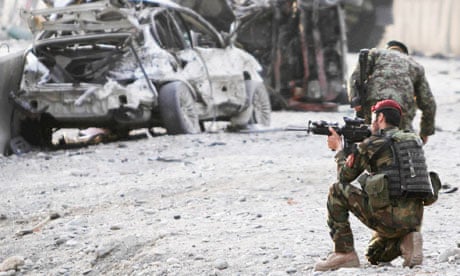A suicide car bomber has killed nine Afghans, most of them civilians, in an attack on a military base in eastern Afghanistan. The Taliban claimed the attack was revenge for the burning of copies of the Qur'an by foreign troops.
The explosion at forward operating base Fenty, which also serves as an airport for the eastern city of Jalalabad, came after nearly a week of deadly rioting triggered when religious books and papers were found in a pit used for burning rubbish at Bagram airbase, north of Kabul.
At least 30 people have died in the violence, among them four US soldiers who were shot by the Afghan security forces they worked with.
Two of the US soldiers were killed in a secure room at the heart of a heavily fortified ministry in Kabul, prompting the coalition to pull hundreds of advisers from embedded posts in ministries across the capital and raising questions about the future of the international mission in Afghanistan.
Foreign efforts are currently focused on training and strengthening Afghan forces to fight the insurgency and allow western combat troops to leave by the end of 2014.
The Kabul attack struck at the heart of the trust needed for that mission. Senior US officials rushed to deny suggestions that the deaths, which one senior diplomat in Kabul described as "ominous", could speed Washington's withdrawal timetable.
"This is not the time to decide that we are done here," the US ambassador, Ryan Crocker, told CNN's State of the Union in an interview from Kabul. "We have got to redouble our efforts. We've got to create a situation that al-Qaida is not coming back."
But the increasing number of foreign soldiers dying at the hands of the Afghan security forces they are meant to be supporting appears to have undermined the commitment of some US allies.
Paris sped up withdrawal plans after four French soldiers were killed by an Afghan army trainee last month, and rioting in northern Afghanistan over the last week also propmted Germany to shut down a military base ahead of schedule.
In a further possible incident of sabotage by Afghans working with foreign forces, the Taliban claimed a cook on a base in eastern Afghanistan had poisoned the food of coalition troops. The insurgent group, which often exaggerates claims of enemy loses, said five people had died and dozens were injured.
Master Sergeant Nicholas Conner, the spokesman for the coalition's eastern regional command, said traces of bleach had been found on food in the dining area of a base near the Pakistan border and it had been shut for investigation, but that there were no deaths or injuries.
The rage of protesters who took to the streets over the Qur'an burning has been largely targeted at the foreign military, but the majority of the dead and injured have been Afghan civilians, and that pattern continued on Monday.
Six of those killed by the car bomb in Jalalabad were civilians, the city police spokesman, Hazrat Muhammad, said. One was an Afghan soldier and two were security guards from the base. Five soldiers and five Afghan security guards were injured.
Three foreign soldiers were also wounded, but their injuries were not life-threatening and the attack did not breach the defences of the base, Conner said.
Most foreign bases in Afghanistan have an outer ring of Afghan guards that make it hard for attackers to kill foreign soldiers in an attack from outside.
